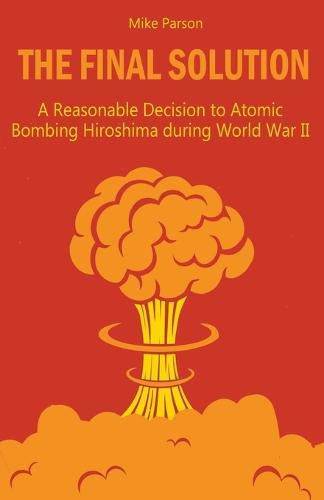Readings Newsletter
Become a Readings Member to make your shopping experience even easier.
Sign in or sign up for free!
You’re not far away from qualifying for FREE standard shipping within Australia
You’ve qualified for FREE standard shipping within Australia
The cart is loading…






This title is printed to order. This book may have been self-published. If so, we cannot guarantee the quality of the content. In the main most books will have gone through the editing process however some may not. We therefore suggest that you be aware of this before ordering this book. If in doubt check either the author or publisher’s details as we are unable to accept any returns unless they are faulty. Please contact us if you have any questions.
The judgments of historians regarding the atomic bombing of Hiroshima during World War II can be grouped into two opposing camps: those who believe President Truman made the right choice and those who decry that decision, considering that other options were ignored. The motives presented for dropping the bomb were suspect. Many critics of the atomic bombing also argue that the decision failed to meet the "discrimination" and "proportionality" criteria outlined in Just War Theory (specifically, jus in Bello or conduct during the war) and, therefore, must be deemed an immoral act.
In examining whether the atomic bombing was a reasonable decision, this book analyzes the critical variables and competing interests that President Truman considered and concludes that the atomic bombing was a sensible and rational choice and, therefore, reasonable. In determining whether the atomic bombing of Hiroshima was a just decision, this thesis examines that fateful decision through the prism of Just War Theory and the Natural Law traditions of the individual's Right to Life and the state's Right to Independence and concludes that it was a just decision.
The detailed review and analysis of the history behind the Hiroshima bombing reveal that President Truman was a prisoner of circumstances that existed in the summer of 1945. The options available to him were distressing. His decision to drop the atomic bomb on Hiroshima, considering the dire situation, was well within reason and, admirably, proved prescient.
$9.00 standard shipping within Australia
FREE standard shipping within Australia for orders over $100.00
Express & International shipping calculated at checkout
Stock availability can be subject to change without notice. We recommend calling the shop or contacting our online team to check availability of low stock items. Please see our Shopping Online page for more details.
This title is printed to order. This book may have been self-published. If so, we cannot guarantee the quality of the content. In the main most books will have gone through the editing process however some may not. We therefore suggest that you be aware of this before ordering this book. If in doubt check either the author or publisher’s details as we are unable to accept any returns unless they are faulty. Please contact us if you have any questions.
The judgments of historians regarding the atomic bombing of Hiroshima during World War II can be grouped into two opposing camps: those who believe President Truman made the right choice and those who decry that decision, considering that other options were ignored. The motives presented for dropping the bomb were suspect. Many critics of the atomic bombing also argue that the decision failed to meet the "discrimination" and "proportionality" criteria outlined in Just War Theory (specifically, jus in Bello or conduct during the war) and, therefore, must be deemed an immoral act.
In examining whether the atomic bombing was a reasonable decision, this book analyzes the critical variables and competing interests that President Truman considered and concludes that the atomic bombing was a sensible and rational choice and, therefore, reasonable. In determining whether the atomic bombing of Hiroshima was a just decision, this thesis examines that fateful decision through the prism of Just War Theory and the Natural Law traditions of the individual's Right to Life and the state's Right to Independence and concludes that it was a just decision.
The detailed review and analysis of the history behind the Hiroshima bombing reveal that President Truman was a prisoner of circumstances that existed in the summer of 1945. The options available to him were distressing. His decision to drop the atomic bomb on Hiroshima, considering the dire situation, was well within reason and, admirably, proved prescient.